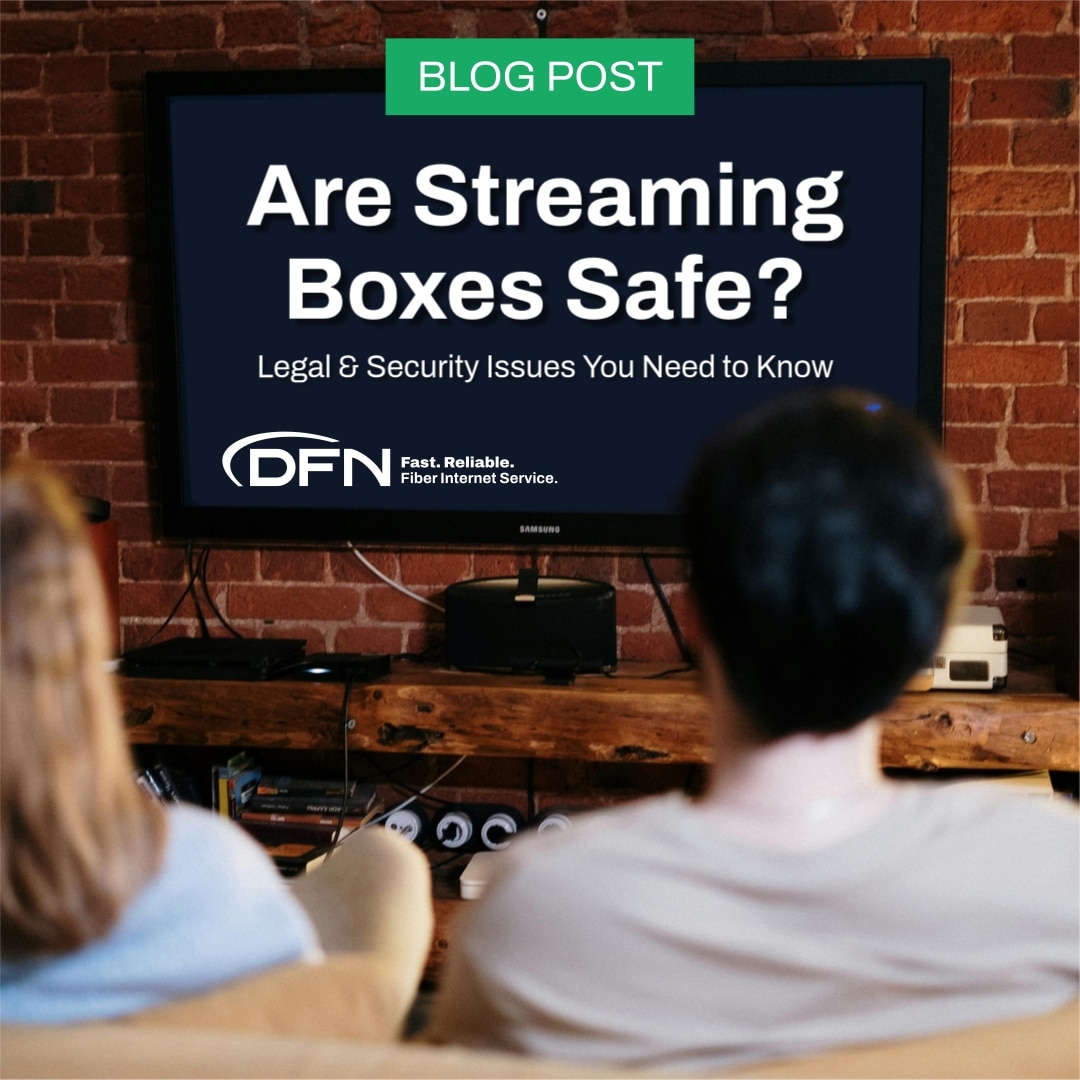Are streaming boxes safe? With more devices promising free movies and live TV without subscriptions, it’s a question every viewer should ask. In this guide, DFN breaks down what streaming boxes are, how to know if they’re legal, and what security risks they pose — plus, how to keep your home internet network safe from malware and data breaches. Learn how DFN’s fiber internet and managed WiFi tools help protect your connected home.
What Are Streaming Boxes and How Do They Work?
Streaming boxes are small set-top boxes that let you stream movies, TV shows, and other media via the internet. They often run on an Android-based operating system, similar to what’s found on many smartphones and smart TVs. They are also sometimes referred to as “superboxes,” “unlocked TV boxes,” or “free TV boxes.”
Streaming boxes typically come pre-loaded with apps to access content, and you can download additional apps and content to them. However, unlike official streaming devices such as Roku, Amazon Fire Stick, Apple TV, or Google Chromecast, many of these boxes are made by unregulated manufacturers that don’t follow the same standards for content licensing or security.
Are Streaming Boxes Legal? Understanding the Risks of Unlicensed Content
At first glance, streaming boxes may sound similar to other devices like Rokus or Fire TV. However, a key difference is that these “official” devices only allow you to install approved streaming platforms and apps, while the Android-based streaming boxes don’t have the same restrictions.
Some third-party boxes rely on unlicensed content sources, which means you could be streaming copyrighted TV shows, movies, or live channels without the proper license. In short, they could be putting you at risk of breaking copyright laws without you even realizing it.
Owning a streaming box is legal perfectly legal. It’s how you use it that matters. Accessing or sharing copyrighted content without permission can violate the Digital Millennium Copyright Act (DMCA) in the U.S. and similar laws in other regions. Users who stream from unlicensed sources may face DMCA takedown notices, fines, or civil penalties.
Internet service providers (ISPs) like DFN are sometimes required by law to respond to copyright complaints, which typically come in the form of warnings sent to customers who violate DMCA. You can learn more about our DMCA policy here https://dfn.net/legal/acceptable-use-policy/.
It’s important to remember that the legality of streaming content depends on your country or region, so always check your local laws before purchasing or using these devices.
Are Streaming Boxes Safe to Use? Security Risks You Should Know
In addition to legal concerns, using streaming boxes may also leave you vulnerable to cybersecurity risks.
Official streaming devices like Roku, Fire Stick, and Apple TV receive regular security updates and oversight and are certified through major app stores, which helps protect your data and home network. However, many Android-based systems use cheaper, uncertified hardware and may lack protections such as Google Play Protect. This makes them more vulnerable to malware infections, spyware, or hidden backdoors that hackers can exploit to access your home network.
DFN takes cybersecurity seriously — from our fiber network infrastructure to managed WiFi systems that give you control over your connected devices. Our team continually monitors new threats like BADBOX to help keep customers protected.
In fact, the FBI recently warned of a malware campaign called BADBOX, which infects unprotected Android-based streaming boxes (and other Internet of Things, or IoT, devices) and uses them in a botnet. (A botnet is a network of hijacked devices controlled remotely by cybercriminals.) According to the FBI’s report, these infected boxes may come preinstalled with malware or become compromised when users install apps from untrusted sources.
Once infected, these devices can be used to send malicious traffic through your home internet connection without you knowing. That “free” streaming box may cost you your online security and privacy.
Key Takeaway:
Some streaming boxes are safe — but many unregulated Android TV boxes can expose your home network to malware or violate copyright laws. Stick with certified devices from trusted brands, keep software updated, and secure your network with DFN’s managed WiFi tools.
How to Safely Choose a Streaming Device and Protect Your Home Network
When shopping for any new tech, research before you buy. Look up the brand and manufacturer, and read customer reviews on the device models. Whenever possible, stick to known, trusted brands that offer ongoing updates and user support.
Avoid boxes marketed as “all channels free forever” or “no subscriptions ever.” They often operate in legal gray or illegal territory.
Confirm that your device includes security certifications, such as “Certified Android TV” and “Google Play Protect.” Keep your firmware and software updated regularly. Hackers often exploit outdated devices.
Finally, protect your home network. Use a firewall or your HomePass by Plume® App to monitor devices and block suspicious activity. With a reliable fiber internet connection and managed WiFi tools, you can monitor what’s connected, manage device permissions, and spot strange traffic before it becomes a problem.
Stay Safe While Streaming with DFN Fiber Internet
If you’re unsure whether your streaming setup is safe, our team can help. With fast, reliable fiber internet and advanced network security tools like HomePass by Plume®, DFN helps keep your home devices and personal data protected.
Visit DFN.net or call (541) 673-4242 to learn more.
